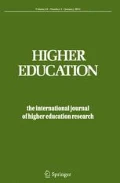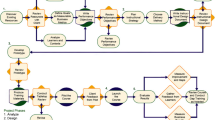Abstract
A graduate level research methods and statistics course offered on the World-Wide Web was evaluated relative to the traditional lWith their consent, course members were randomly assigned to the two versions of the course for the first block of sessions. For the second block of sessions the groups crossed over to access the alternative version of the course. Quantitative and qualitative outcome data were collected to sample cognitive and affective domains. Improvements in knowledge and reductions in anxiety were apparent following both versions, with no significant differences between versions being detected. Analysis of course member comments indicated less satisfaction with the teaching input on the web-based version but more satisfaction with the peer collaboration that was stimulated. An activity theory framework is applied in conceptualising the findings and generating recommendations for further course development and evaluation.
Similar content being viewed by others
References
M.H. Ashcraft E.P. Kirk D. Hopko (1998) ‘On the cognitive consequences of mathematics anxiety’ C. Donlan (Eds) The Development of Mathematical Skills. Psychology Press Hove 175–196
C. Chen R. Rada (1996) ArticleTitle‘Interacting with hypertext: A meta-analysis of experimental studies’ Human–Computer Interaction 11 125–156 Occurrence Handle10.1207/s15327051hci1102_2
J.S. Daniel (1998) Mega Universities and the Knowledge Media: Technology Strategies for Higher Education Kogan Page London
A. Dillon R. Gabbard (1998) ArticleTitle‘Hypermedia as an educational technology: A review of the quantitative research literature on learning comprehension, control and style’ Review of Educational Research 68 322–349
Y. Engeström (1987) Learning by Expanding: An Activity-Theoretical Approach to Developmental Research Orienta-Konsultit Helsinki
Engeström Y. (2001). Expansive Learning at Work. Towards an Activity-Theoretical Reconceptualisation. Lifelong Learning Group, Occasional Paper No. 1. Institute of Education, London
Friedrich K.R., Armer L. (1999). ‘The instructional and technological challenges of a web based course in educational statistics and measurement’. Presented at the Society for Educational Technology and Teacher Education 10th International Conference, San Antonio, TX, February 28–March 4 1999
R.D. Harding S.W. Lay H. Moule D.A. Quinney (1995) ArticleTitle‘A mathematical tool-kit for interactive hypertext courseware: Part of the mathematics experience within the Renaissance project’ Computers Education 24 127–135 Occurrence Handle10.1016/0360-1315(95)00003-5
L. Hewson C. Hughes (2001) ‘Generic structures for on-line teaching and learning’ F. Lockwood A. Gooley (Eds) Innovation in Open and Distance Learning. Kogan Page London 76–87
H-M. Huang (2002) ‘Towards constructivism for adult learners in online learning environments’, British Journal of Educational Technology 33 27–37
K. Issroff E. Scanlon (2002) ArticleTitle‘Using technology in higher education: An activity theory perspective’ Journal of Computer Assisted Learning 18 77–83 Occurrence Handle10.1046/j.0266-4909.2001.00213.x
Jacobson, M.J. and Spiro, R.J. (1993). Hypertext Learning Environments, Cognitive Flexibility and Transfer of Complex Knowledge: An Empirical Investigation. Tech Report, Champagne IL, Centre for the Study of Reading University of Illinois
Y.J. Katz (2002) ArticleTitle‘Attitudes affecting college students’ preferences for distance learning’ Journal of Computer Assisted Learning 18 2–9 Occurrence Handle10.1046/j.0266-4909.2001.00202.x
S. Kemmis (1993) ‘Action research’ M. Hammersley (Eds) Educational Research: Current Issues. Chapman London
B. King (2001) ‘Making a virtue of necessity – a low-cost, comprehensive online teaching and learning environment’ F. Lockwood A. Gooley (Eds) Innovation in Open and Distance Learning. Kogan Page London 51–62
M. Knowles (1990) The Adult Learner: A Neglected Species EditionNumber4 Gulf Publishing Houston
KuuttiK. (1996) ‘Activity theory as a potential framework for human–computer interaction research’ B. Nardi (Eds) Context and Consciousness: Activity Theory and Human–Computer Interaction. MIT Press Mass 17–44
LandauerR. (1995) The Trouble with Computers MIT Press Cambridge, MA
D. Laurillard (2002) Rethinking University Teaching: A Conversational Framework for the Effective use of Educational Technology EditionNumber2 Routledge London
A.N. Leont’ev (1981) Problems of Development of the Mind Progress Moscow
F. Lockwood (2001) ‘Innovation in distributed learning: Creating the environment’ F. Lockwood A. Gooley (Eds) Innovation in Open and Distance Learning. Kogan Page London 1–14
L. Lockyer J. Patterson B. Harper (1999) ArticleTitle‘Measuring effectiveness of health education in a web-based learning environment: A preliminary report’ Higher Education Research and Development 18 233–246
R.H. Maki W.S. Maki M. Patterson P.D. Whittaker (2000) ArticleTitle‘Evaluation of a web-based introductory psychology course: I. Learning and satisfaction on-line versus lecturer courses’ Behavior Research Methods, Instruments and Computers 32 230–239
J. Monsen B. Graham N. Frederickson R.J Cameron (1998) ArticleTitle‘Problem analysis and professional training in educational psychology: An accountable model of practice’ Educational Psychology in Practice 13 234–249
R. Oliver C. McLoughlin (2001) ‘Using networking tools to support online learning’ F. Lockwood A. Gooley (Eds) Innovation in Open and Distance Learning. Kogan Page London 148–159
B.S. Plake C.S. Parker (1982) ArticleTitle‘The development and validation of a revised version of the Mathematics Anxiety rating Scale’ Educational and Psychological Measurement 42 551–557
M. Recker P. Pirolli (1995) ArticleTitle‘Modelling individual differences in students’ learning strategies’ Journal of the Learning Sciences 4 1–38 Occurrence Handle10.1207/s15327809jls0401_1
F.C. Richardson R.M. Suinn (1972) ArticleTitle‘The Mathematics Anxiety Rating Scale: Psychometric data’ Journal of Counselling Psychology 19 551–554
G. Roberts (2003) ArticleTitle‘Teaching using the Web: Conceptions and approaches from a phenomenographic perspective’ Instructional Science 31 127–150 Occurrence Handle10.1023/A:1022547619474
G. Salmon (2000) E-Moderating: The Key to Teaching and Learning Online Kogan Page London
D.A. Schön (1987) Education the Reflective Practitioner Jossey-Bass San Francisco, CA
S. Vaughn J.S. Schumm J. Sinagub (1996) Focus Group Interviews in Education and Psychology Sage Thousand Oaks, CA
L. Vygotsky (1978) Mind in Society: The Development of Higher Psychological Processes Cambridge University Press Cambridge
P. Whalley (1993) ‘An alternative rhetoric for hypertext’ C. McKnight A. Dillon J. Richardson (Eds) Hypertext: A Psychological Perspective. Ellis Horwood London
W.M. Williams S.J. Ceci (1997) ArticleTitle“How’m I doing?’ Problems with student ratings of instructors and courses’ Change 29 IssueIDSept/Oct 13–23
D. Wood J.S. Bruner G. Ross (1976) ArticleTitle‘The role of tutoring in problem-solving’ Journal of Child Psychology and Psychiatry 17 149–161
C. Zimitat (2001) ArticleTitle‘Designating effective in-line continuing medical education’ Medical Teacher 23 117–122 Occurrence Handle10.1080/01421590120036538 Occurrence Handle11371287
Author information
Authors and Affiliations
Corresponding author
Rights and permissions
About this article
Cite this article
Frederickson, N., Reed, P. & Clifford, V. Evaluating Web-supported Learning Versus Lecture-based Teaching: Quantitative and Qualitative Perspectives. High Educ 50, 645–664 (2005). https://doi.org/10.1007/s10734-004-6370-0
Issue Date:
DOI: https://doi.org/10.1007/s10734-004-6370-0




